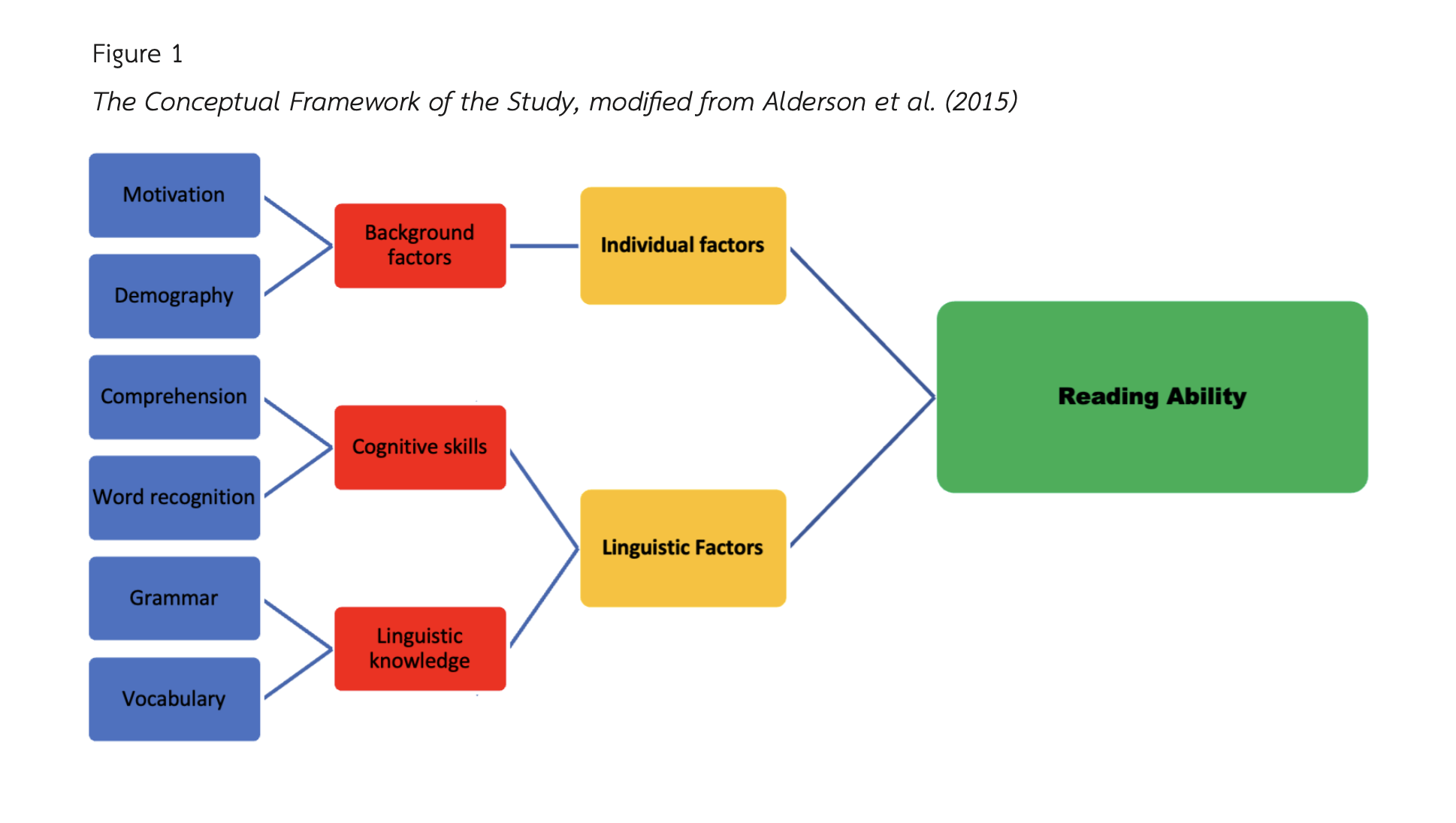DIAGNOSING ENGLISH READING ABILITY IN CAMBODIAN LOWER SECONDARY SCHOOL STUDENTS
Main Article Content
บทคัดย่อ
Cambodian lower secondary school students’ deficits in English learning have raised concerns in the educational field. Despite the improvement in most of the study subjects by the Education Reform, most students are still struggling to learn English, particularly reading. This current study identifies their strengths and weaknesses in English reading and seeks some practical guidelines that can be applied to enrich their reading ability. This study answered these two research aims through quantitative and qualitative research designs. The study recruited both lower secondary school students and their teachers of English in a Cambodian high school to participate in a reading test, questionnaire, and interviews. The data analysis employed descriptive statistics and content analysis to offer the key results.
The results of the research found that:
1) Lower secondary school students had very strong demographic backgrounds, such as living with educated parents, being literate in their first language, or having a high interest in English reading, and they also had strong motivation for English reading. However, they were weak in grammar and word recognition and very weak in reading comprehension and vocabulary, respectively.
2) Six teaching guidelines: ensuring students’ foundation of English, focusing on students’ vocabulary, explaining grammar in reading texts, ensuring students’ reading fluency, teaching reading sub-skills, and helping learners set goals were suggested.
Article Details

อนุญาตภายใต้เงื่อนไข Creative Commons Attribution-NonCommercial-NoDerivatives 4.0 International License.
** ข้อความ ข้อคิดเห็น หรือข้อค้นพบ ในวารสารสหวิทยาการสังคมศาสตร์และการสื่อสารเป็นของผู้เขียน ซึ่งจะต้องรับผิดชอบต่อผลทางกฎหมายใด ๆ ที่อาจเกิดขึ้นจากบทความและงานวิจัยนั้น ๆ โดยมิใช่ความรับผิดชอบของคณะนิเทศศาสตร์ มหาวิทยาลัยราชภัฏรำไพพรรณี **
เอกสารอ้างอิง
Agbo, I. I., Kadiri, G. C., & Ekwueme, J. (2019). Investigating the impediments to reading comprehension in junior secondary Schools: Evidence from JSSII students in Nsukka Metropolis. Advances in Language and Literary Studies, 10(2), 143-151.
Alderson, J. C., Brunfaut, T., & Harding, L. (2014). Towards a theory of diagnosis in second and foreign language assessment: Insights from professional practice across diverse fields. Applied Linguistics. doi: 10.1093/applin/amt046
Alderson, J. C., Haapakangas, E. L., Huhta, A., Nieminen, L., & Ullakonoja, R. (2015). The diagnosis of reading in a second or foreign language. Routledge.
Alowalid, A, Mujiyanto, J., & Anggani Linggar Bharati, D. (2018). The Linguistic Factors That Affect Poor Reading Comprehension Among Libyan Students. English Education Journal, 8(2), 229-240. https://doi.org/10.15294/eej.v8i3.22466
Ancheta, R. F. (2018). Reading Ability of EFL learners: The case of level 3 students of Gulf College, Oman. European Journal of English Language Teaching. 3(1), 22-32.
Araromi, M., & Olatubosun, O. (2018). Students’ reading-related factors as predictors of achievement in english reading comprehension in lagelu local government area, oyo state, nigeria. European Journal of Education Studies, 10(1), 33-44.
Brown, H. D. (2004). Language assessment: Principles and classroom practices. Pearson Education.
Chandran, Y., & Shah, P. M. (2019). Identifying learners’ difficulties in ESL reading comprehension. Creative Education, 10(13), 3372-3384.
Dara, D. (2019). Investigating English reading comprehension problems of Cambodian high school students. American International Journal of Social Science, 8(3), 52-56.
EF Education First. (2021). EF English proficiency index. https://www.ef.com/wwen/epi/regions/asia/cambodia/
Evans, J. D. (1996). Straightforward statistics for the behavioral sciences. Cole Publishing Co.
Gbadegesin, M. O. (2019). Reading Ability and Public Secondary School Students’ Performance in English Language in Saki-West Local Government Area of Oyo State. Journal of English and Communication in Africa, 2(1), 33-45.
Gilakjani, A. P., & Sabouri, N. B. (2016). A study of factors affecting EFL learners’ reading comprehension skill and the strategies for improvement. International journal of English linguistics, 6(5), 180-187.
Grabe, W. and Yamashita, J. (2022). Reading in a second language: Moving from theory to practice.Cambridge University Press.
Halliday, M.A.K. (1973). Explorations in the functions of language. Edward Arnold.
Hassan, I. J., & Dweik, B. S. (2021). Factors and challenges in English reading comprehension among young Arab EFL Learners. Academic Research International, 1(2), 18-30.
Hemmati, S. J., Baghaei, P., & Bemani, M. (2016). Cognitive Diagnostic Modeling of L2 Reading Comprehension Ability: Providing Feedback on the Reading Performance of Iranian Candidates for the University Entrance Examination. International Journal of Language Testing, 6(2), 92-100.
Kasim, U., & Raisha, S. (2017). EFL students’ reading comprehension problems: Linguistic and non-linguistic complexities. English Education Journal, 8(3), 308-321.
Khan, R. M. I., Shahbaz, M., Kumar, T., & Khan, I. (2020). Investigating reading challenges faced by EFL learners at elementary level. Register Journal, 13(2), 277-292.
Khataee, E. (2018). Reading failure among Iranian EFL learners: Study of underlying problems. Journal of English Language & Translation Studies, 6(3), 164-176.
McNeill, A., dos Santos Gonçalves, A., & da Costa, P. (2019). A study of the reading difficulties of second-year efl learners at public secondary school of kayrala cmanatuto timor-leste. Isce. Journal of Innovative Studies on Character and Education, 3(1), 50-77.
MoEYS (2019). បញ្ជីរាយនាមបេក្ខជនប្រឡង “ជាប់” សញ្ញាបត្រមធ្យមសិក្សា ទុតិយភូមិ ចំនេះទូទៅ និងបំពេញវិជ្ជា https://drive.google.com/file/d/1Km6Jb02X349sg2Z0DsbZEp85uMhOuIXy/view
Purpura, J.E. (1998). Investigating the effects of strategy use and second language test performance with high- and low-ability test takers: A structural equation modelling approach. Language Testing, 15(3), 333–379. doi:10.1177/026553229801500303
Septia, N. W., Indrawati, I., Juriana, J., & Rudini, R. (2022). An Analysis of Students’ Difficulties in Reading Comprehension. EEdJ: English Education Journal, 2(1), 11-22.
Sok An Kdey Tontoem (2021). របាយការណ៍លទ្ធផលប្រឡងសញ្ញាបត្រមធ្យមមសិក្សា បឋមភូមិ
Taha, A. H. A. rahman M. & Alhameem, T. (2019). Reading Comprehension Difficulties Faced by Sudanese School Learners: A Case Study. International Journal of Linguistics, Literature and Translation, 2(6), 279–289.
Taladngoen, U., Palawatwichai, N., Estaban, R. H., & Phuphawan, N. (2020). A study of factors affecting EFL tertiary students’ reading comprehension ability. Rangsit Journal of Educational Studies, 7(1), 12- 21.
Torabi, S., & Maleki, R. (2022). An Investigation into Iranian EFL Learners' Reading Comprehension Problems and the Tentative Solutions: Learners' Perceptions in Focus. Anatolian Journal of Education, 7(1), 123-138.
Webb, S. A. (2009). The effects of pre-learning vocabulary on reading comprehension and writing. Canadian Modern Language Review, 65(3), 441-470.
Weisi, H. (2012). Is reading comprehension of ESP program improved by explicit teaching of grammar?


